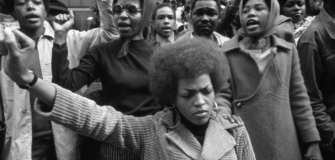Get Your Mind Right: The Upspoken Guide to Therapy
Share
April is stress awareness month, but at Upspoken we’re prioritizing our mental wellness year round. We know. Therapy is expensive, good therapists are hard to come by, and opening up and being vulnerable to a stranger can be difficult. We have a lot to be mad about and we deserve to have access to healthcare that addresses our unique needs and sees us as Black women. Research has shown, negative sociopolitical experiences including racism, discrimination, and sexism put African American women at risk for low-income jobs, multiple role strain, and health problems, all of which are associated with the onset of mental illness. Upspoken is here to encourage you to take care of yourself and be empowered to put your mental health first. Black women deserve therapy too. Here’s how:
Search with intention. Finding the right therapist is like dating or shopping for a car. You have to get clear about what you want! There are different types of mental health professionals and they all provide different services and treatments according to what you are experiencing. When seeking a mental health professional, think about what kind of therapy you’re interested in, what positive results might look like, how often you’re willing to meet, and if you are considering including medication in your treatment. Therapy is not one size fit all and there are differences and limitations among mental health professionals that can lead to inadequate treatment and counsel which impacts your well-being.
Speak up for your needs. Women of Color make up less than five percent of psychiatrists, psychologists, and social workers. While it is #goals to be treated by someone who looks like you, for many of us it isn’t likely. We expect that all mental health professionals are trained to understand the complexities of Black womanhood and the stressors we face yet this isn’t always the case. So, in your search for a professional, be prepared to question your potential therapist on their ability to be culturally sensitive. Do they recognize the mistreatment Black people have experienced at the hand of the medical community? Do they understand the impacts of racism? Do they keep these things in mind when giving suggestions and recommending treatment plans? If you are expected to spend $50-200 per session for services, you have the right to care that acknowledges your Blackness and Womanhood.
Be patient. Therapy takes time. The first couple of sessions won’t result in a breakthrough. Like anything else meaningful, this journey requires due diligence and in time you’ll see results. Healing can take months, years, or decades. Unpacking trauma, unlearning unhealthy behaviors, and learning to cope is a long process. There is no one path to healing and the journey isn’t easy. When things get tough, remember, your story makes you who you are. The work you’re doing to love yourself, be whole, and be a light in the world are worth the time and treatment.
Be kind to yourself. Learning to love and take care of yourself is crucial to survival. How you feel dictates how you treat yourself and therefore how you treat others. No is a complete sentence and it’s okay to set boundaries. Making time to do more of what makes you happy can be simple. Taking time for yourself doesn’t have to be expensive or demand a lot of resources.
Below are some resources to help you practice self-care and address your mental health needs.
- Therapy for Black Girls (Directory of Black Therapists and podcast)
- Psychology Today (Directory of licensed therapists in your area)
- Dear Black Women Project (Affirmations and self-care tips)
- Helpline Number 2-1-1 (local and state programs that offer free and low-cost counseling)




Follow Us